Hello! This is Uri from Guerrilla Poker making a video of a live 3 table game, NL500 and NL1k.
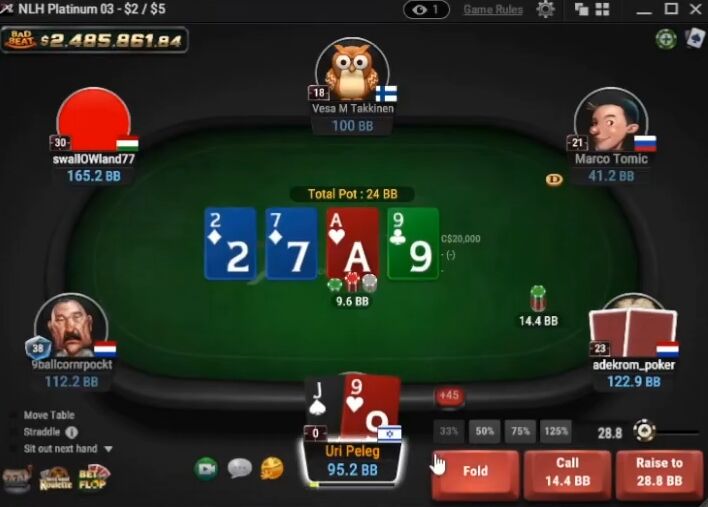
I'll fold. To defend against his line, Ax are enough for me, of which plenty are in my range. From an exploit standpoint, it's unlikely that people will overbet bluff often enough, but in theory I don't need to defend a 9 either.
As a reminder, my philosophy at these not-so-high stakes hasn't changed – I want to overfold against aggression and bluff into weakness.
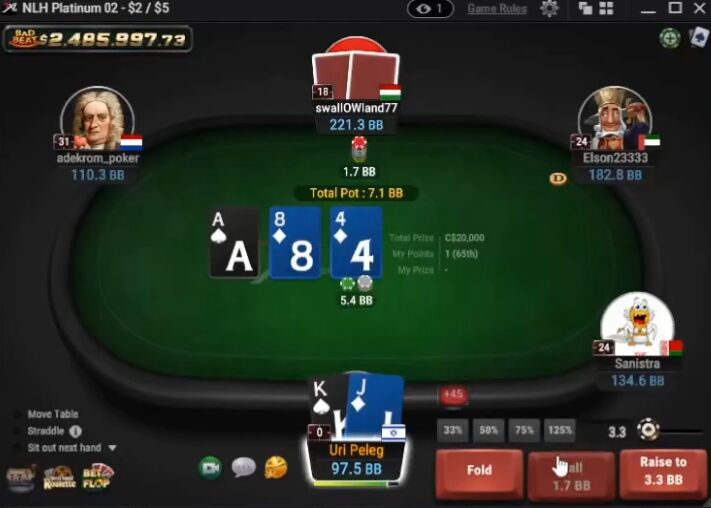
Borderline, but I'll call.
Turn (8.7bb):
Uri checks, opponent checks.
River (8.7bb):
Now we need to understand whether we want to bet. It depends on the texture of the board and the number of unimproved hands in my range. , , diamond draws – they all missed. My opponent bet one third on the flop, which means he still has kings and queens that I can value own myself against. Therefore, I will bet with a very small sizing. I don't know if the min bet is optimal, but it seems right to me.
Bet 1bb. The opponent thinks for a long time and calls .
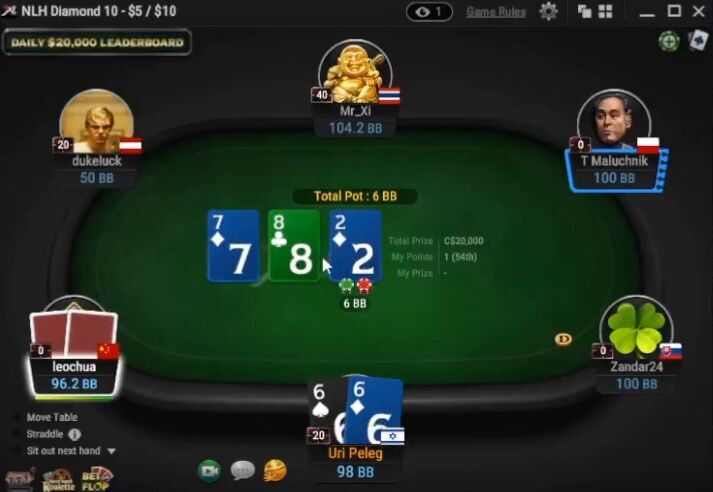
Not the texture where I will cbet 100% blind v blind, and so, sixes are clearly not in the polar c-bet range. Therefore, check.
The opponent checks back.
Turn (6bb):
King is a very good card for me. After checking the flop, the odds of Villain holding a 7 or 8 decreased, so we looked like we had a good opportunity for another min-bet to protect the hand and sometimes get called by A-high.
Bet 1bb. The opponent folds.
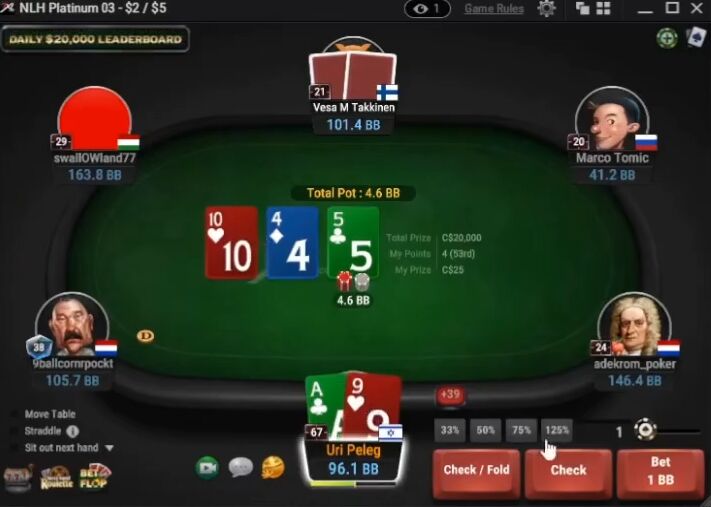
We only have one over card to the ten, I'll check. Prefer to bet with , , .
Turn (4.6bb):
Opponent checks.
Is A9o high enough in my range for me to check back? Perhaps yes.
Checks again.
River (4.6bb):
Villain bets 6bb.
Now we need to decide if we want to call or if we prefer to fold. In borderline situations like this, I usually trust my intuition. And it says that my hand from opponents side looks like A-high, and there was something suspicious in the timing of the opponent. So I'll call.
Opponent wins with .
Now I have to write a note on the opponent. Additional information may help in the future. In addition, borderline situations, when we make difficult choices and do not guess, usually slightly affect the emotional state. As you know, I don't herocall that often, so I need to check if the call is caused by tilt and if the failure has led to tilt. While writing notes, I check my condition and calm down :)
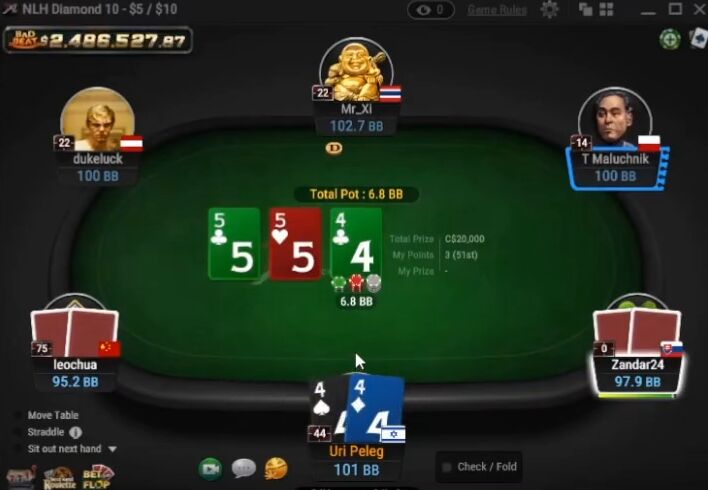
Here we made a standard small open and now check our whole range on the flop against two people. I'll start betting later.
Everyone checks.
Turn (6.8bb):
BB checks. Uri bets 3.4bb. MR folds, BB calls.
River (13.6bb):
BB checks. Uri bets 10.2bb. The opponent folds.
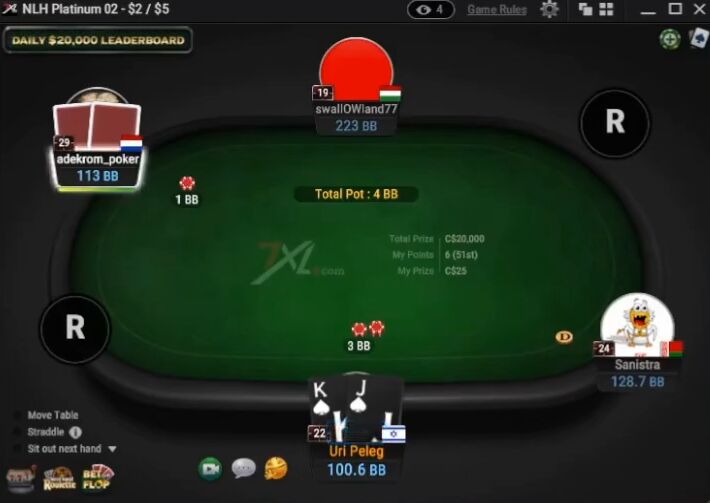
Villain calls.
Flop (6bb):
Uri bets 2bb. Villain calls.
Turn (10bb):
Check – check.
River (10bb):
After he checks the turn, I can bet, but I don't have to. You can check again, both options are good.
Villain bets 7bb.
Easy call.
Wins against .
Another benefit of checking is that our opponent can make a value bet with a hand worse than ours!
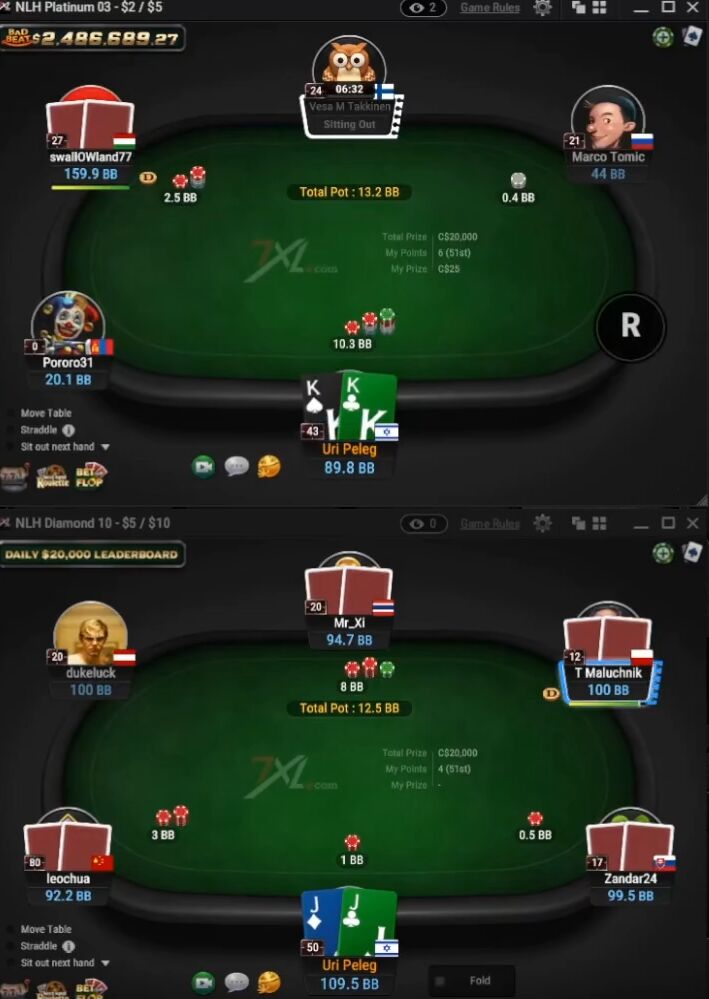
Standard 3-bet with kings, and below is an interesting situation. I guess I like 4-betting. It's a bit loose, but the UTG player looks like an amateur, and the cutoff's 3-bet sizing seems a bit small to me.
With jacks Uri reraises to 22bb, both opponents give up.
Villain at the top calls the 3-bet.
Flop (20.9bb):
Uri bets 10.5bb and the BB calls.
Turn (41.8bb):
I don't see an alternative to the bet-bet line. The queen improves my range so I would just as well continue barreling with , , . With kings, I'm ready to stack off and will gladly do so.
Bet 22.9bb. Villain calls.
River (87.6bb, effective stack 56.4bb):
Of course, I lose to all sets and 76s, but there are not so many combinations, I have to push.
Goes all-in. Villain thinks for a while and calls with .
Perhaps, I address the question of the correctness of the opponent's line to the audience. What do you think about this? Good, bad, marginal?
First of all, he should ask himself if I'm betting worse hands three barrels for value. For example, . The answer, I suspect, will be no. (If yes, then call with can be fine.) Then he should count my bluffs. Will I bluff three barrels with 98s or T9s, for example, or bluff with .
Personally, his call does not please me. I think I'm much more likely to bluff three streets with a hand containing an 8 than I am to super-thin value bet with . If you ask the solver, he will probably give up with some eights and bluff catch with some, but in a practice, this advice is not very useful, since people strongly deviate from GTO on all streets. In real life, such a call, I think, will not make money.
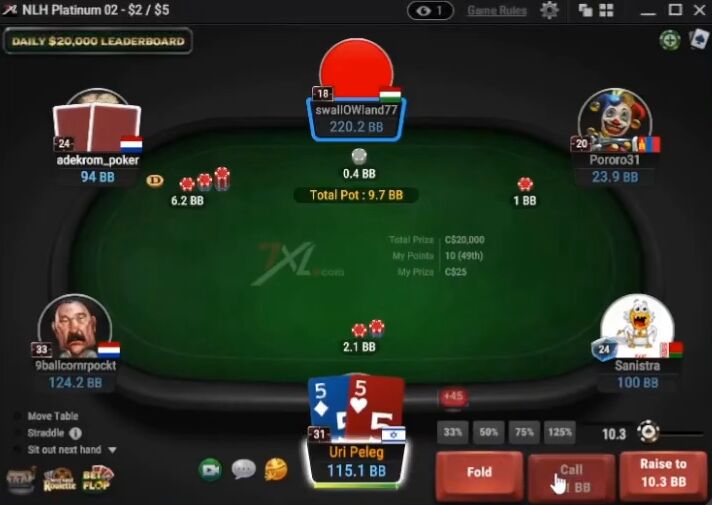
Fives are very sensitive to 3-bet sizing and rake levels as they are essentially set-mining. To a slightly larger 3-bet, I would find a fold. And for this sizing I would fold at NL100 and NL200.
Calls.
Flop (13.8bb):
Folds to a bet of 4.1bb.
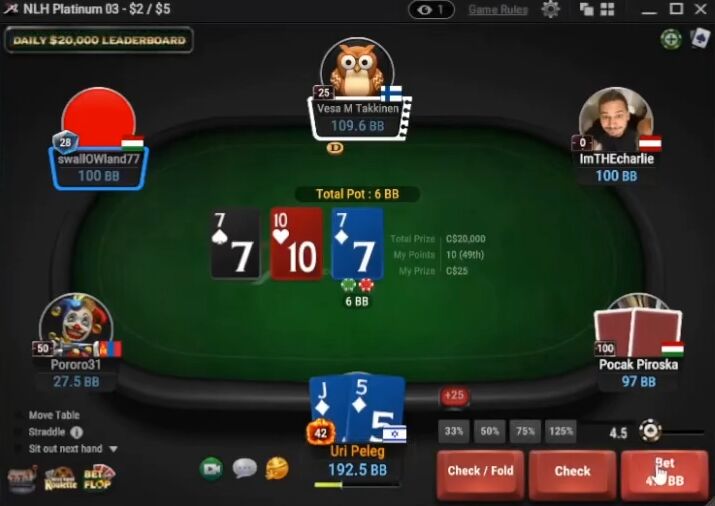
We play in the blinds against a missed continuation bet. I think it's time to start bluffing. You can check, of course. But if you think your opponents will overfold and you want to exploit it, the aggressive line will play better.
Bet 4.5bb. The opponent folds.
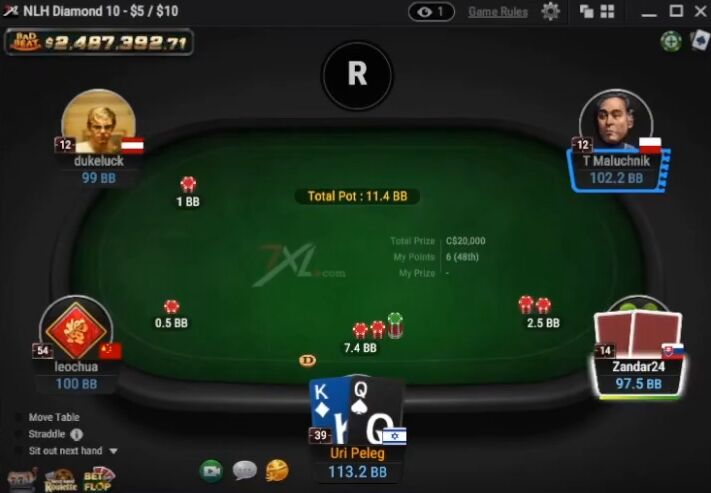
Villain calls.
Flop (16.3bb):
Opponent checks.
A good texture for me, I probably bet my whole range, including , , , A5s. Therefore, we start with a small sizing.
Bet 5.4bb. Villain calls.
Turn (27BB):
Opponent checks.
How often does a nine improve him? KJs, T9s maybe and J8s. I think I should check. In its range are , , and many other hands are weaker, so the solution is marginal.
Checks.
River (27bb):
Villain bets 20.5bb.
I feel compelled to call with KQo. Although of the bluffs in his range I can only name . The situation is not ideal.
By the way, can he bet with ? I think he can. This is also an argument in favor of calling. Although the call is still rather bleak.
Calls and loses .
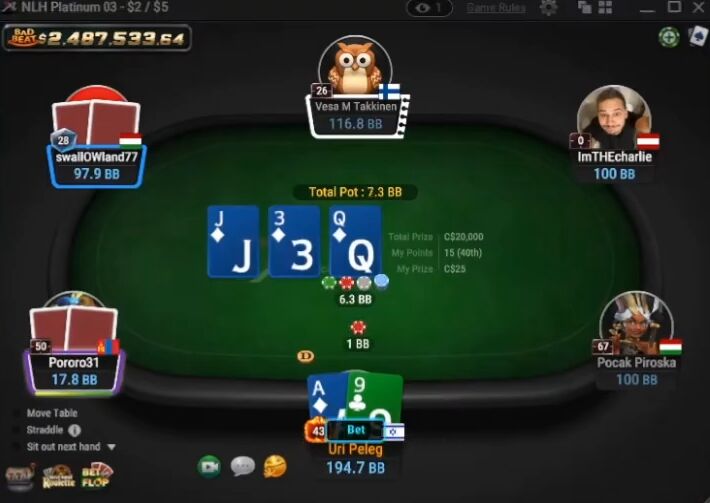
The small blind folds, the big blind calls.
Turn (8.3bb):
BB checks. Uri bets 6.2bb and takes the pot without comment.
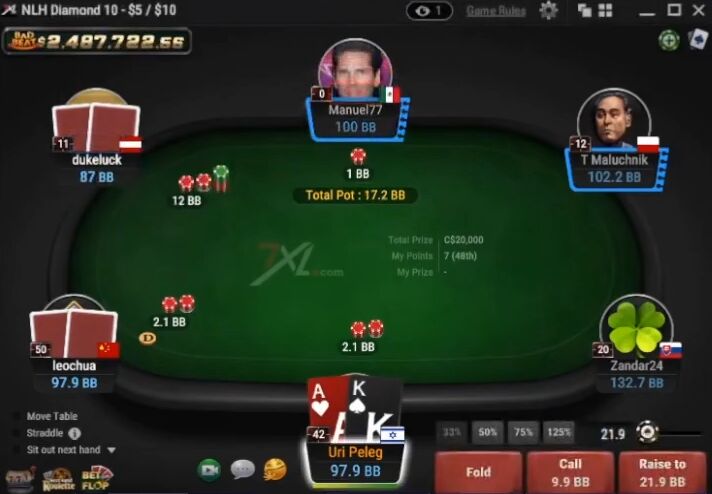
We got a pretty big squeeze. In such cases it's good to just push.
Pushes. Villain thinks for a very long time and calls with AKo. The pot is chopped.
He thought so long, this is a mistake. In the range of pushing vs. squeezing, it is , and aces or kings play this way with a very low frequency. Therefore, he should call quickly and confidently. Perhaps you can write a note that he may be too cautious or afraid to play big pots.
As you can see, even a standard hand can be a reason for a note. Timing helps us to feel the psychological state of the opponent during the game, to get into his head. I think he's capable of making big folds, so it's worth bluffing a little more against him.
But do not take all my notes in this video as a guide to action, because the people I played with could also watch this episode and adjust their game!
There was also one very simple call for me in this session, which I thought about for a long time and almost folded, so you can also bluff against me – I will overfold. However, I don't really hide it.
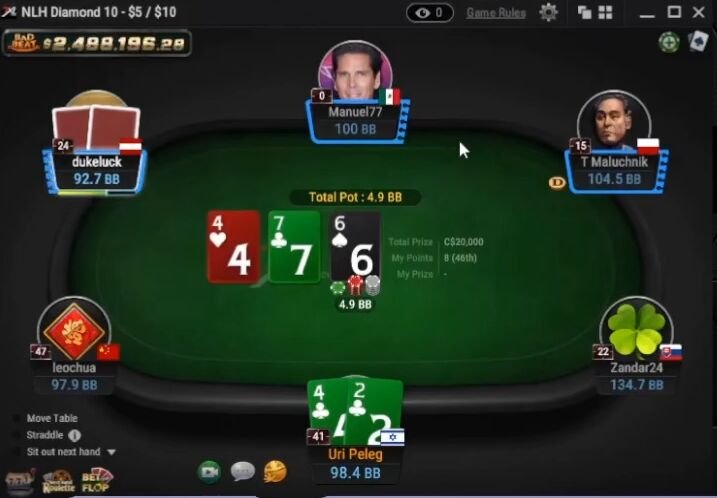
MP checks next.
Turn (4.9bb):
If dukeluck were prone to aggressive lines, our two pair could immediately start playing overbets. Against this supposedly overfolding opponent, I'll make a more modest bet.
Bet 3.7bb. Villain calls.
River (12.3bb):
Now I'll make a very small bet for him to raise with an overpair. Such a bet that I can make, for example, with a four.
Bet 3bb. The opponent folds.
Quickly folded, did not even think about the possibility of a bluff raise. It can be done, for example, with . He seems to be playing really tight.
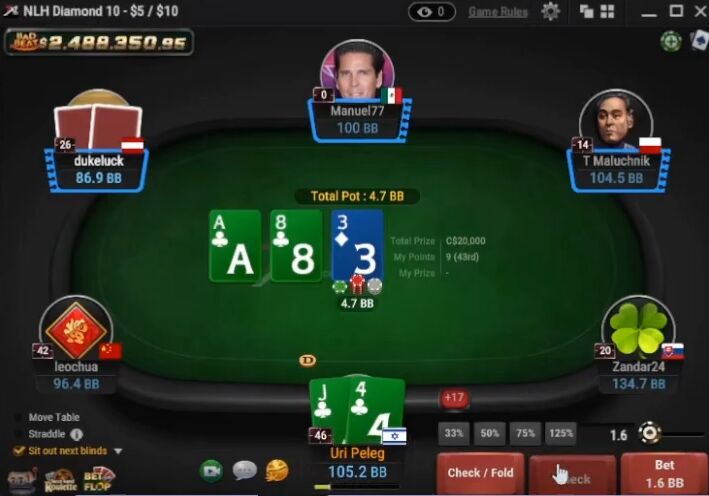
What do we do against such a player when we have a flush draw? Basically, you can play whatever you want. I'll c-bet a little and bluff if I don't improve. It's possible to check, but it won't help you win if the flush hits, because your opponent won't hero-call anyway.
Bet 1.6bb. The opponent folds.
There is no good way to get these players when we have a hand. Against them, we make money by forcing folds when we have nothing.
That's all for today. I hope you were interested. Like and subscribe to the channel!











